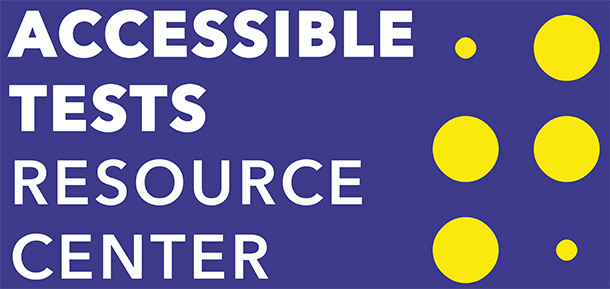Go to navigation for Accessible Tests Resource Center
Tests & Assessments
Information on accessible tests and related materials available from APH as well as from other sources.
Large-Scale Computerized Assessments for Students with Disabilities
Contact: The University of Kansas/Center for Educational Testing and Evaluation (CETE) at atea@ku.edu
Practice Tests in KITE system and Accessibility Guide
Key Resources
- **Installation of KITE system
- **KITE login
- **Accessibility Guide for Technology Enhanced Items
- **ATEA project documents
KITE Client-Practice Tests (KAP)
Practice tests are available for educators to see a sampling of the types of questions (both regular and technology-enhanced) that a student in a particular grade range might encounter on a summative assessment.
Accessing Practice Tests
NOTE: To access the practice tests, you must have KITE Client installed on your desktop, laptop, or tablet computer.
To access the practice tests, perform the following steps:
- Open the KITE Client.
- Enter a username and password from the tables on this page.
HINT: Be sure to choose Practice First on the welcome screen.
KAP Logins — No PNP Settings
| Level (grades) | Subjects | Username | Password |
|---|---|---|---|
| Elementary (3-5) | ELA, Math | practice.pnp.elem.demo | job85 |
| Middle School (6-8) | ELA, Math | practice.middle.demo | send8 |
| High School (9-11) | ELA, Math | practice.high.demo | sake2 |
**This page was a handout provided at the 2016 CCSSO: National Student Assessment Conference held in Philadelphia, PA on June 20-22, 2016.
KAP Logins — with PNP Settings
The following logins allow educators to see how the PNP (Personal Needs and Preferences) settings affect the test environment. All settings are active for all the logins.
| Level (grades) | Subjects | Username | Password |
|---|---|---|---|
| Elementary (3-5) | ELA, Math | practice.pnp.elem.demo | silt7 |
| Middle School (6-8) | ELA, Math | practice.pnp.middle.demo | cloud |
| High School (9-11) | ELA, Math | practice.pnp.high.demo | rice5 |
KITE™ KITE Client Practice Tests KAP, 2014 © The University of Kansas, ATS Help Line 785-864-3537 or kite-support@ku.edu
**This page was a handout provided at the 2016 CCSSO: National Student Assessment Conference held in Philadelphia, PA on June 20-22, 2016.
Northwest Evaluation Association (NWEA) Road to Accessible MAP
In fall 2016, schools and districts began using an accessible version of NWEA’s Measures of Progress® (MAP®) growth assessment which has been made accessible to test takers with visual impairments via refreshable braille display and/or JAWS speech output. In late September 2016, some APH staff took the opportunity to conduct an accessibility review on an actual sample of MAP test items; feedback was provided to NWEA staff in order for them to continue to work toward full accessibility of MAP. NWEA is committed to this important goal. An article appeared in the October 2016 APH News regarding access to MAP and several related resources.
NWEA Partners with CAST, UDL Experts, and NCAM Staff to Make their Measures of Academic Progress (MAP) Accessible via Use of Alt-Tags and Text-Based Descriptions

The Northwest Evaluation Association (NWEA) developed Measures of Academic Progress® (MAP®) many years ago. MAP uses computer adaptive testing (CAT) in which the next test item a student receives is based on his or her current response. Therefore, different students are moving through a test responding to different test items. Because of CAT, it was extremely difficult or impossible to make a braille version of MAP.
In recent years, NWEA has partnered with the Center on Applied Specialized Technology (CAST), Universal Design for Learning (UDL) experts, and staff from the National Center on Accessible Media (NCAM) at WGBH to train NWEA’s test and item writers on the framework of UDL and accessibility. One way NWEA is now making MAP more accessible is by applying alternative text or alt-tags to images within their test items. Alt-tags refers to language descriptions for pictures, graphs, charts and other images. This provides access to information that might otherwise be unavailable to students who are blind or who have a visual visual disability.
Read the article on “What does equity and accessibility look like within assessment?” by Elizabeth Barker, May 10, 2016.
For more information about NWEA, visit their website at NWEA.org or call 503/624-1951, or write to Northwest Evaluation Association, 121 NW Everett, Portland, Oregon, 97209.


